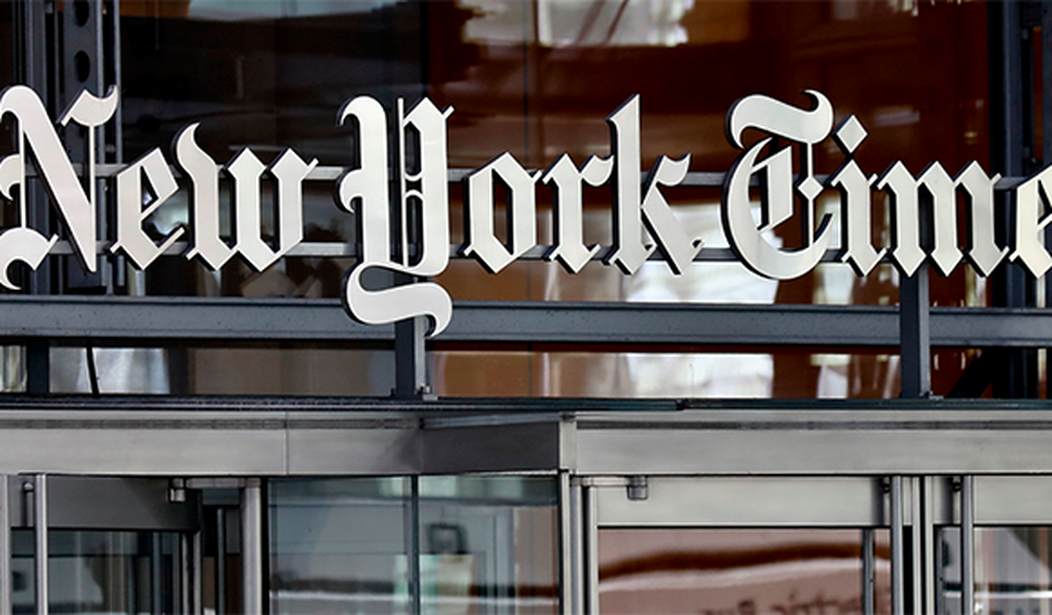Bringing up the disgraced reporter from years past is so far removed as to possibly serve as a distraction.
In the wake of the scandal that is the New York Times needing to retract most of its celebrated podcast series ‘’Caliphate’’, due to the subject matter being revealed as a hoax, we are learning more about the internal operations. What has gradually been revealed is how this furor emerged as a result of the management and executive editors’ actions, or even their lack of reactions. The problems revealed have been institutional, and the behavior is ongoing.
As things erupted this month, many have brought up the name of a disgraced former Times reporter who delivered a scandal for the Times, Jayson Blair. In 2003, it was revealed that Blair, a young upcoming journalist at the paper, had fabricated stories and resorted to plagiarism in much of his work. With the latest news about the podcast series becoming cast in claims of falsehoods, many have invoked Blair’s name as a comparative, which is a mistake. The ‘Caliphate’ issue is far worse.
While this latest scandal has been a story brewing for some time, it was the recognition of the paper in the past couple of weeks that there were severe problems with this offering that has launched this into the news. Awards have been returned and the star reporter behind the series, Rukmini Callimachi, has been completely reassigned, all while management is grappling with addressing the issues behind this event. (I recently covered the background of the story here.)
Except, upon further analysis, you see where the departures exist and how the ‘Caliphate’ problem is not only far bigger in scope but actually exposes the problems leading to so many similar issues taking place at The Times. Instead of fault lying with one reporter, and the direct editor/supervisors, this new problem exposes the management teams.
Problems actually began years ago, with the reporting being done by Callimachi. She rose to become one of the vaunted names in journalism as a result of her in-depth field reporting from the Middle East while covering terrorist activities. There were other reporters from the Times who expressed concern over some of the questionable content in her dispatches, but there was little reaction from those with editorial control.
Not restricted to other staff writers, Callimachi was also being challenged at times over veracity by foreign journalists, as well. These warning signs were roundly pushed aside, as the management wanted to push forward with establishing the new podcast series. There has been ample analysis that the executive editors were loathe to apply the same strict journalism standards placed on the writing onto the audio medium. This shows there was a combined influence; the hesitancy to vet podcast content while harboring a desire to launch a celebrated series.
This already displays the differences between this and the Jayson Blair scandal. In that case, you had a lowly reporter, one possibly straining to gain notice, whose antics were not properly supervised as he resorted to fabulism. It led to the Times installing a new standard across its editorial landscape The differences with the ‘’Caliphate’’ problem run both deeper, and higher up. As Times columnist Ben Smith noted in an introspective piece on the podcast scandal, the problems rest with the decision-makers. Another staffer at the paper wrote of Smith’s assessment, “He’s basically saying, whatever failures Rukmini had in her reporting, the bigger failure is leadership.”
Smith is more than correct. In this case, it was not a cub reporter who was slipping untested content into the paper — Callimachi was a celebrated journalist. The editors ignored initial story concerns on her work, and then as she was granted the podcast series the content of that broadcast also became suspect. Yet every time warnings were delivered they were dismissed by those in control. This means they gave the series to a disputed reporter which then led to the delivery of disproven content, and embarassment for the largest news outlet in the country.
That there has been little in the way of change following this explosive news is being revealed. After the management came clean with recognition of the problems there was an episode on the Times popular podcast ‘’The Daily’’ where the problems were laid out by executive editor Dean Baquet. Only, not all the problems were addressed. Host of ‘’The Daily’’, Michael Barbaro, had numerous ties with ‘’Caliphate’’ — including the sharing of technical staff and being engaged to that show’s producer — while he never disclosed those connections. Barbaro also lobbied journalists at other outlets to downplay their coverage of the Times scandal.
To suggest this ‘’Caliphate’’ problem compares to the Jayson Blair issue of years past ignores that this is showing to be an institutional problem at the paper of record. This is not a case of a rogue reporter — it is management willing to forego journalism standards in order to push a narrative and sell its content. Not only is this bigger than Blair, it will be far tougher to repair the damage and to fix the problems.














Join the conversation as a VIP Member